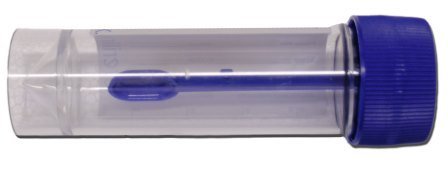Faecal Calprotectin
Chemical Pathology
Notes
Access to this test is limited as follows:-
Primary Care: refer to G-Care: IBS Care Pathway for appropriate use.
Secondary Care: restricted to Consultant Gastroenterologist difficult cases.
- Faecal calprotectin is an inflammatory marker that can distinguish organic bowel disease (inflammatory bowel disease or IBD) from functional bowel disease (irritable bowel syndrome, IBS).
- Faecal calprotectin is primarily used to provide an indication of which patients require follow up studies such as colonoscopy.
- The test is also used in determining disease activity and monitoring response to treatment in patients with ulcerative colitis and Crohn’s disease.
- Note that treatment with NSAIDs may increase a patient's faecal calprotectin by approximately twofold.
Sample requirements
1 - 5 g faeces collected into a stool collection pot.

Downloadable patient information leaflet: How to collect a stool sample for Faecal Calprotectin analysis
Storage/transport
Send at ambient temperature to the laboratory. If unavoidable, samples can be stored refrigerated overnight.
Required information
Relevant clinical details, including reason for the request.
Turnaround times
Samples are assayed at Gloucestershire Royal Hospital with results normally available within 2 weeks.
Reference ranges
Results are reported in µg/g faeces.
| Result | Interpretation |
|---|---|
| < 150 µg/g | Normal |
| > 150 µg/g | Significant bowel inflammation, advise referral to gastroenterology |
FOR REQUESTS MADE AS PART OF THE GLOUCESTERSHIRE IBS PATHWAY
- FCAL <150 µg/g: This result rules out Inflammatory Bowel disease with 98% certainty. As patient has already met the criteria for irritable bowel syndrome (IBS) and has been refractory to standard treatments please refer to GHNHSFT Complex IBS Service.
- FCAL >150 µg/g: please refer to Gastroenterology for further investigation of the cause of this raised result.
Further information
NICE Faecal Calprotectin Diagnostics Guidance DG11
G-Care Refractory IBS Pathway (for clinicians)
Page last updated 27/06/2018